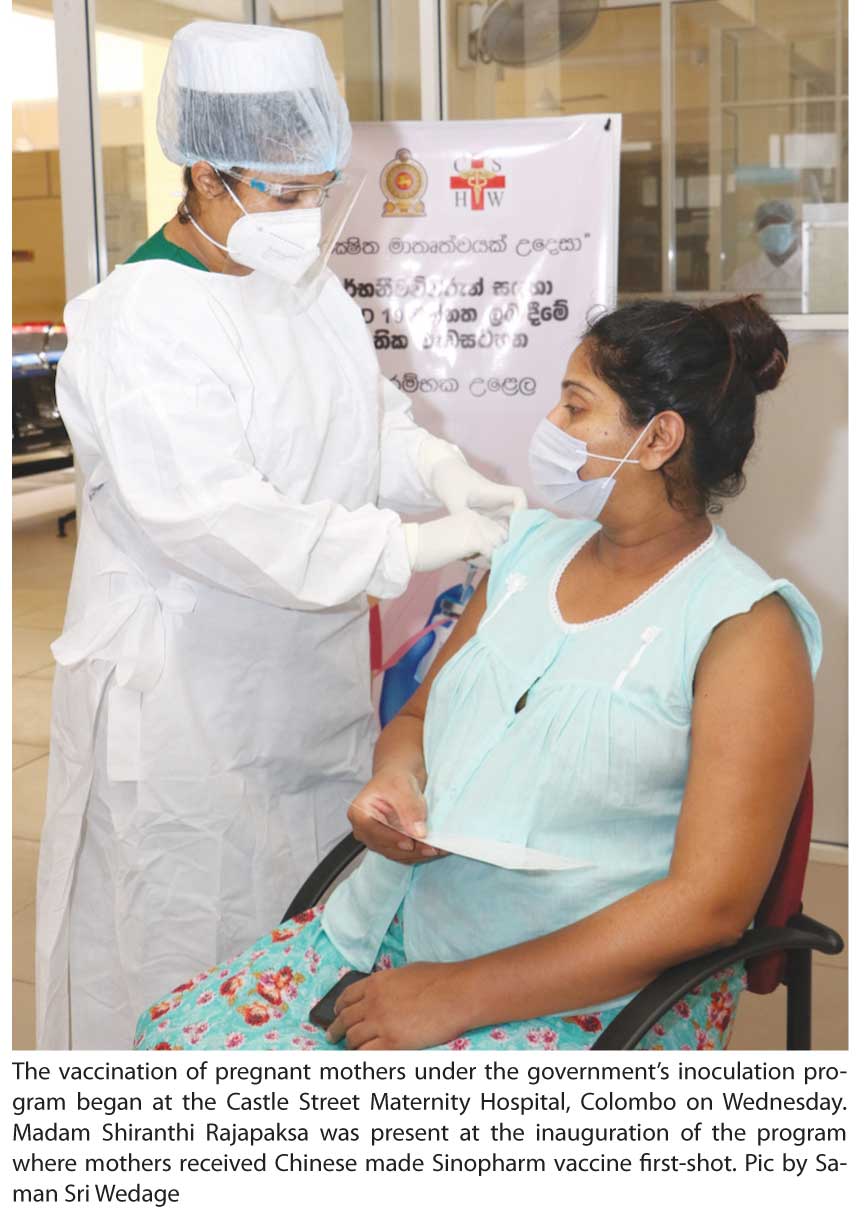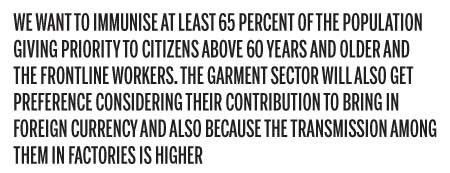
Primary Health Care, Epidemics, and COVID Disease Control State Minister Dr. Sudharshani Fernandopulle in an interview with the Sunday Observer explains the issues faced by the state Covid-19 vaccination drive and how the Government plans to overcome them.
Q: Some of the countries have recommended the use of Pfizer and Moderna vaccines as the second dose for those who got the first shot of Astrazeneca considering the risk of blood clots associated with the latter. Any plans here to follow this model?
A: We are still trying to get down Astrazeneca to complete the second doses for those who received the same vaccine earlier. Even with Pfizer people have experienced side effects. In the US, a doctor died after receiving a Pfizer jab due to an allergic reaction. Allergic reactions can be associated with any vaccine.
We are still trying to get down the 600,000 doses of Astrazeneca. Now I think we have got a green light from Japan. President Gotabaya Rajapaksa had requested Japanese Prime Minister Yoshihide Suga to assist Sri Lanka in meeting the shortfall.
Q: Initially it was recommended to have the second dose of the Astrazeneca vaccine between 9-12 week intervals. The people are concerned if this deadline has expired now?
 A: Initially they said the booster shot must be given after four weeks, but thereafter with continuous studies, the researchers said the response was better when the second dose is delayed up to 12 weeks.
A: Initially they said the booster shot must be given after four weeks, but thereafter with continuous studies, the researchers said the response was better when the second dose is delayed up to 12 weeks.
After the supply chain constraints suffered due to the soaring cases in India, many countries have come up that it was alright to delay it as much as 16 weeks. With the first dose the antibody level remains high for about 12 weeks. The transmission will be reduced by 67 percent. According to the latest recommendations by the WHO, the second dose can be delayed upto six months.
If the antibody response is good, it prevents deaths and developing severe disease. Technically when the first dose is given there is an antibody reaction for about three weeks. With the booster shot, antibody levels increase.
Most countries due to the shortage in vaccines have decided to continue with only the first dose. The WHO recommended continuing with only the first dose if the prevalence of the disease is very high and if there is a shortage. This is to cover a bigger population so that deaths and severe cases can be avoided.
After the first dose, if you contract the disease, antibodies will be formed, because your system has been programmed to produce antibodies.
In an event if we are unable to get Astrazeneca, then the technical committee will have to decide what vaccine can be used as the second dose, whether its Pfizer or Johnson and Johnson. But still we have not come to that stage. We are hopeful that the Government can acquire the 600,000 doses of the Astrazeneca vaccine in the coming weeks.
Q: With the new research findings, what is the latest deadline to get down the vaccine for those who received Astrazeneca jab?
A: We go by the 12-16 week guideline. But even if there is a one or two week delay that will not make a big difference. The WHO has said the second dose can be given even six months apart.
We hope that the Government will be able to secure a stock of Astrazeneca vaccines by July.
We have been reaching out to the countries that have extra stocks - the UK, Australia, France, Norway, Sweden, the European Union, Canada and the US.
The countries in the European Union conveyed that they have pledged their extra doses to the WHO’s COVAX program. The WHO has promised to vaccinate 20 percent of our population under their COVAX program, but they are also affected by the situation in India, where the Serum Institute, the world’s largest vaccine manufacturer has suspended the delivery overseas due to the spiraling cases in the domestic front.
There is a positive reaction from the Japanese Government after the President’s request to the Japanese Prime Minister. Japanese Ambassador in Colombo Sugiyama Akira who met the President on Wednesday had conveyed this to the President. So we are hopeful.
Q: Reports indicated that the State Pharmaceutical Corporation has ordered five million doses of Pfizer vaccine?
A: Yes, we have ordered the Pfizer vaccine from the producers.
Q: Can’t we get the vaccine through intermediators?
 A: We heard that there were extra doses of Astrazeneca in Afghanistan, but we were not sure of their cold storages and then we tried to get a stock of vaccines from Myanmar, but later heard that they don’t have extra doses.
A: We heard that there were extra doses of Astrazeneca in Afghanistan, but we were not sure of their cold storages and then we tried to get a stock of vaccines from Myanmar, but later heard that they don’t have extra doses.
We are reluctant to get it from third parties due to the risks and high prices involved.
We have always secured the Covid-19 vaccines from the manufacturers through government to government contacts, to be sure the vaccines we obtain are in good condition.
The Government at one point was ready to buy at a high price from third sources, but the quality of the vaccines was in question. Therefore, the idea was abandoned.
Q: What is the vaccination plan, can we complete the target before the end of this year?
A: That is the plan, but all depend on the availability of the vaccines. We want to immunise at least 65 percent of the population giving priority to citizens above 60 years and older and the frontline workers. The garment sector will also get preference considering their contribution to bring in foreign currency and also because the transmission among them in factories is higher. Most garment workers are in the 18-30 years age category.
The vaccination of pregnant mothers also commenced on Wednesday.
Q: There was a controversy over the Astrazeneca second dose at a Covid-19 vaccination centre at Unawatuna, Galle where people from Colombo had received the jab instead of the intended recipients. What is being done to prevent such irregularities?
A: When there is a huge demand for something which is in short supply, such irregularities tend to happen. We have never heard of such allegations involving free child vaccination programs of the Government. The Government is very concerned about this incident.
There is an ongoing investigation by the Health Ministry and top regional health officials have already been transferred over this unfortunate incident. (Regional Director of Health Services and the Regional Epidemiologist of the Galle District have been transferred in connection with the incident, after a preliminary inquiry)
Q: Will the Government decide to continue the travel restrictions beyond June 14?
A: The President is very concerned about economic hardships and food security of the lowest strata of the society, who are daily wage earners.
The doctors recommended a lockdown for two weeks late May, but the Government went ahead and extended it by another week till June 14 considering the health risks.
However, extending it further is not easy. The final decision lies with the Presidential Task Force on Covid-19. It will make a decision looking into all the possibilities and advice from the doctors and other stakeholders.
Q: Sri Lanka recorded the highest number of 67 Covid-19 deaths announced in a day on Wednesday despite the Government imposed travel restrictions. What is the reason for the increasing number of deaths?
 A: It is because of this current variant. The B.1.1.7 is a highly transmissible and highly virulent variant of the Covid-19 virus. It causes more complications. In April, health officials predicted a high death rate, an increase of about 55 percent, in the second wave of the pandemic.
A: It is because of this current variant. The B.1.1.7 is a highly transmissible and highly virulent variant of the Covid-19 virus. It causes more complications. In April, health officials predicted a high death rate, an increase of about 55 percent, in the second wave of the pandemic.
Usually there is a lag of about 2 to 3 weeks between a person getting exposed to the virus, showing symptoms and death.
In this variant, within the first ten days some deaths have been reported.
The daily cases of infections have also increased to around 3,000 now.
Q: Is the ratio of Covid-19 infections and deaths higher in Sri Lanka than other countries?
A: The number of cases per million population is higher in Sri Lanka than even in India according to the data analysis by the Director of Information in the Ministry of Health.
We believe it is due to the B.1.1.7 strain that is prevalent in Sri Lanka. The studies are continuing. We still have the UK variant, the Indian variant has not been detected in society.
Q: In the backdrop of these revelations, do you think the countrywide lockdown should be lifted. The Sri Lanka Medical Council has also recommended a two week curfew to contain the rapid spread?
A: Comparatively more people were moving about this time than the previous lockdowns.
There are two sides to the story. The curfew can be imposed, but food security of the people will be a major issue.
The purchasing power of people too needs to be considered. A Government cannot look at only one side. Ideally it is best if we can extend the lockdown from another one week.
The general incubation period of the disease is 2 -14 days. Thus the people who got exposed to the virus at the beginning of the lockdown will complete the incubation period by about June 7. The people who got exposed during the lockdown will also complete their incubation period if the lockdown is extended by another week. But the fact that the majority of people have daily paid jobs, their income being deprived and the struggles of farmers to sell their produce, these are serious issues, so all these factors will have an effect on a decision to extend the lockdown.
